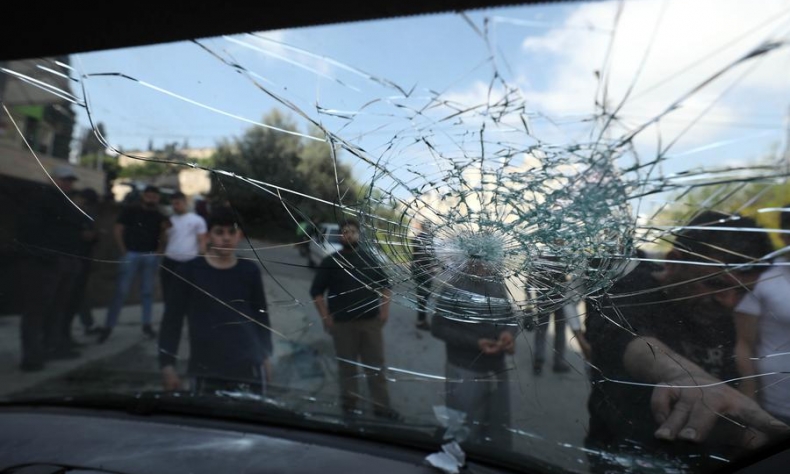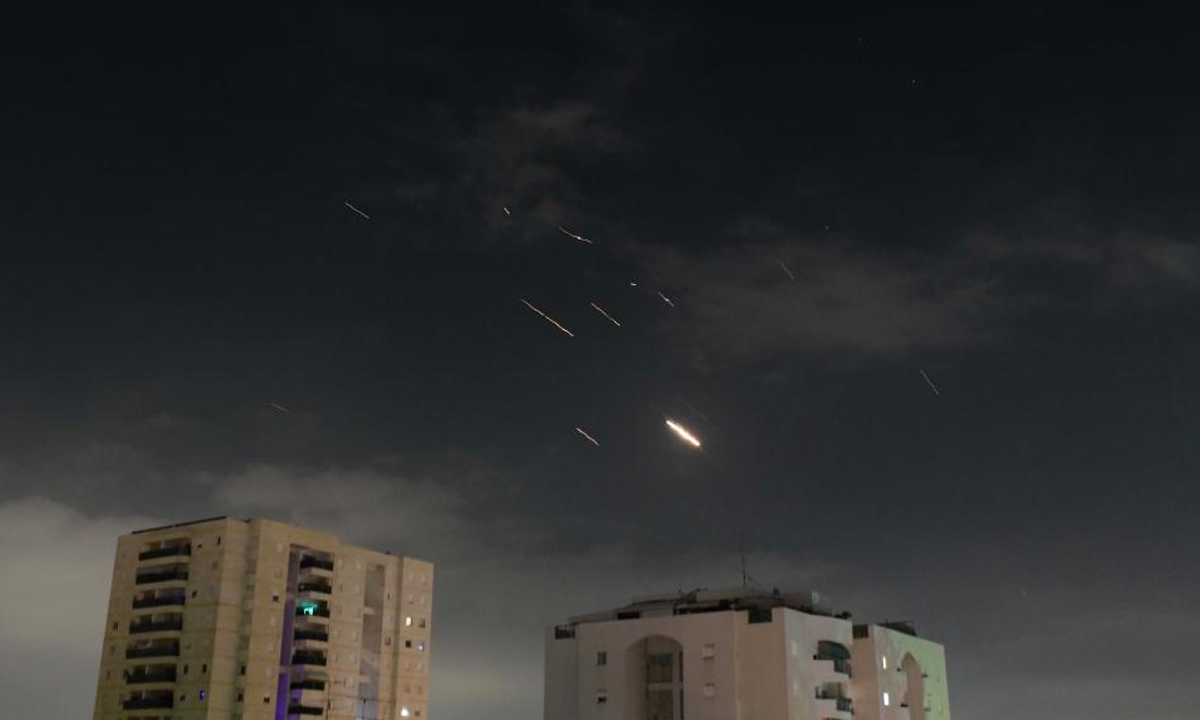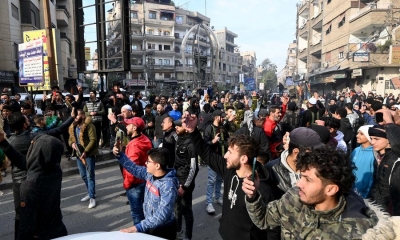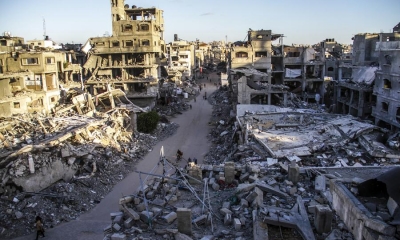Will Iran’s Historic Retaliation Bring a Wider War?

Although Iran’s action is historic and dramatic, the central political issue in the region remains the Palestine issue and its solution.
Iran’s measured retaliation for Israel’s attack against its embassy compound in Damascus is historic and brings conflict in the Middle East to a new stage. The myth of Israel’s invincibility is over and thus changes the strategic and psychological situation in the region.
The April 1 attack against the Iranian embassy compound was illegal under long-settled international law and diplomatic practice. But Israel has never been restrained by international law or by the United Nations and simply ignores them as seen over the years.
Iran’s retaliation made clear that Israel is not able to defend itself on its own. It needs the active protection and assistance of Western powers. This has been the case in the past such as in the 1973 war when the U.S. assisted Israel fend off Egypt.
Iran’s retaliatory strike on April 14 against Israel is historic on several accounts. It is regarded as the largest coordinated drone strike in history. It is the first time that Iran itself directly struck Israel rather than relying on regional forces associated with the Axis of Resistance in Lebanon, Syria, and Iraq.
The Israeli attack
On April 1, Israel in a surprise attack destroyed a part of the Iranian embassy compound in Damascus. The target was a meeting of three top Iranian military officials. The attack successfully assassinated the three key Iranian officials coordinating the regional forces of the Resistance in Lebanon, Syria, and Iraq.
The assassinations were and are a severe blow to Iran and disruptive of Iran’s regional activity. Israel’s capabilities for assassinations are well known and have resulted in some spectacular actions over the years. The apparent lack of situational awareness and operational security measures of the three Iranian officials is remarkable and puzzling to some.
It is not known whether the Israeli attack was known to, and coordinated with, the United States and other Western governments. One air force base in the south of Israel and one key intelligence base in the north were apparently used in the attack operation against the Iranian embassy.

Iran’s retaliation
The Iranian retaliation to respond to the devastating Israeli attack was measured. This is to say that only military targets were chosen. The levels of damage by incoming Iranian ballistic missiles are not yet known. The two targets were those that Iran believed were involved in the Israeli attack on the Iranian embassy.
Iran has said repeatedly that it would retaliate against the locations from which Iran was attacked whether on land or at sea. This was demonstrated by Iran in a retaliation against a U.S. military base several years ago.
Western media was full of speculation about the timing and extent of Iran’s response to the April 1 attack against its embassy compound. Some pundits and journalists seemed to believe that Iran would not dare retaliate. Others thought retaliation would be immediate. Events showed the speculations of the Western media to be, as usual, uninformed and incorrect.
Iran’s response involved several hundred drones, cruise missiles, and ballistic missiles. Although the precise identity of the systems used is not yet clear, they served their purpose. In a carefully orchestrated strike, the drones were launched first, then after an interval the cruise missiles, then after another interval the ballistic missiles. It is confirmed that three Israel’s targets have been hit, including two airbases – Nevatim airbase and Ramon airbase – and an intelligence gathering base in the north.
The barrage of drones and cruise missiles purposely depleted Israel’s air defense capability and overwhelmed it. Observers do not believe that Israel destroyed 99 percent of incoming systems and attribute that number to propaganda. Iranian ballistic missiles in fact defeated Israel’s air defense and hit targets.
The United States, United Kingdom, France, Jordan, and Saudi Arabia participated in the defense of Israel through air defense operations. This was a major effort and details are bound to emerge. The regional and global reputation of these countries is inevitably degraded by their actions.

A wider war coming?
Although the Israeli government has said it will attack Iran for its April 13 response to the original Israeli attack, it is not clear whether this is merely a rhetorical bluster or if Israeli leaders actually intend to carry out further attacks against Iran.
Iran said that the intention of its dramatic and historic retaliation was to restore deterrence and to change the equation in the Middle East. This signals a belief that the regional situation has thereby entered a new stage and phase.
Iran has also stated that it will respond more forcefully to any further Israeli attacks against Iran directly or indirectly against its citizens and interests.
The regional psychological balance of terror has changed because perceived Israeli dominance and invulnerability were ended by the historic Iranian retaliation. The public opinion on the “Street” in the Muslim and Arab world is now said to have gained confidence not to mention regained some dignity.
It can be said that global psychology has been impacted by the dramatic success of Iran’s measured military response. Such a change not only affects public opinion but also impacts the calculations of governments.
This psychological change takes place within the already changing public opinion around the world about Israel’s genocide in Gaza and in occupied Palestine.
Although Iran’s action is historic and dramatic, the central political issue in the region remains the Palestine issue and its solution.
However, war against Iran has been a longstanding stated goal of Israeli Prime Minister Bibi Netanyahu and his political allies. His political coalition depends upon the extreme right wing in Israel and his cabinet reflects this fact.
Over the years, Netanyahu and his allies in the U.S. pro-Israel Lobby and neoconservative foreign policy network have urged war against Iran. They were successful in promoting the U.S. war against Iraq two decades ago as some will remember.
Already calls by pro-Israel zealots for war against Iran are heard in the halls of the U.S. Congress. The House speaker made the bizarre and dangerous statement that the U.S. being a “Christian” country should support Israel.
Such delusional politicians in the U.S. are heavily funded by the pro-Israel Lobby. It is thus possible that a vote in Congress in favor of war against Iran would be carried. Two decades ago, only some 10 percent of Congress voted against the Iraq war. The U.S. wasted an estimated 8 trillion dollars on that unnecessary war.
While watching closely the developments of the current situation after Iran’s retaliation against Israel, the central issue of Middle East remains the Palestine Status. The only way to resolve the Palestine Issue is through diplomacy. The international community must insist on the rule of international law and the centrality of the United Nations organization in order to avoid war and to promote peace and development in the Middle East.
The article reflects the author’s opinions, and not necessarily the views of China Focus.
 Facebook
Facebook
 Twitter
Twitter
 Linkedin
Linkedin
 Google +
Google +







